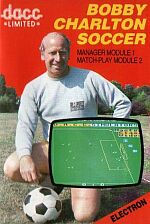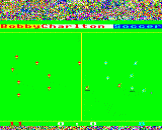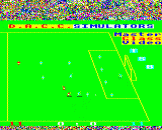Introduction
A game designed to capture the imagination. Further modules to be added at regular intervals. From three minutes to 45 minutes play duration. Two players, one player versus computer or computer only. Full teams of 11 players per side. Select team characteristics - formation and individual player skill, accuracy and stamina. Authentic moves: kick-off, throw-ins, goal kicks, corners, passing, shooting, etc. Optional injuries can be added. Large three dimensional aerial view of the pitch. Sound effects: Uses 16 colour mode 2 graphics.
Analogue joysticks optional but preferred.
This game contains: Module 1 : Manager & Module 2 : Match-Play.
Bobby Charlton
I am not just endorsing this game, I have been involved in its concept giving guidance and advice.
Welcome to Bobby Charlton Soccer. I am sure you will enjoy many hours of playing the world's greatest sport, in your own home, in a way not possible before. We have developed this computerised soccer game in such a way as to most closely match the real thing as is possible, with not only full 22 player all-action matchplay, but many other features such as the pre-match levels for each player, and the way that over-worked players tire faster than their team-mates. With full control over every player's movement, direction, speed and each kick controlled in strength, direction and height, all from the joystick (or keyboard) you have everything you need to play top-class soccer against your mates or even against the computer.
When soccer is played on a computer, I think it is important that the players have as much of the field in view as possible, so that accurate pasing to men on the flanks of farther up the field can be made. To achieve this, we made our men smaller and the field view larger. The idea is that you pass the ball much more, involving the whole team, rather than concentrating on one man all the time. Many 'true-to-life' features have been added to ensure that maximum realism is felt when playing, such as the men slipping and falling if you turn them too quickly, and stamina levels dropping when too few of them do all the work. So you can see, the only way to win is by playing your team as a team, accurate passing, gradual build-up and the shot on goal, and even then the accuracy of each man may vary according to how to you built up your team before the match. We have enjoyed putting this game together and we're sure you are going to enjoy playing it.
- Bobby Charlton
How To Play
The game may be played by two players, or by one player against the computer. There are two parts to the standard game, the first in which each player constructs his team and briefs his men. The second part is the match itself, which is played in full with each player controlling the actions of his team with his joystick (or keyboard keys).
Part 1. Manager Module
At the start of a game each player takes on the role of the team manager. This is the 'dressing room' phase of the game, during which you determine the distribution of skills and stamina amongst your men and the formation they are to play, including any number of special 'variations'. For each of your eleven men you are able to set the levels of 'skill', 'stamina' and 'accuracy' that they possess on a scale of 1 to 5.
At first, the levels are all set at 3, which means a total of 9 per man. The total for the team is therefore 99 (11 x 9). You may adjust the levels for any or all of your eleven men, but the overall total must never exceed 99. That means, of course, that the total qualities for both teams are equal, but what really counts is that some men can be made better players than others, and only you know which, not your opponent. When the match is under way you can concentrate your game towards the stronger men, increasing your chances of scoring. Adjust the 'levels' for the man currently under the cursor by pressing keys 1-5, firstly for 'skill', then for 'accuracy' and finally for 'stamina'.
The other main area of control over your team's strategy is in positional play. You can select one of the standard formations, which will be displayed on the screen with the men in the appropriate positions. You may then move any of the men to new positions, so creating your own 'special' match tactics in positional play. During this 'positioning' process you see a bird's eye view of your half of the pitch, with the keeper at the bottom and the centre line across the top. Select the player to be moved by placing the flashing cursor over him. The number of the selected man is displayed at the top-left of the screen. Now move that man in any direction using the cursor keys (for small steps) or shift and cursor keys (large steps). The flashing cursor is moved with the '<' and '>' keys (
Once both players have completed their manager strategies, and the length of the game has been selected, it is time for the actual match to begin. If you taken the option to include injuries, these will be randomly allocated (if any) to your men by the computer. The effect of injuries will be felt in the performance of any man unlucky enough to get them. Although the 'injuries' option may be omitted, it is for the sake of realism that we have included them in Bobby Charlton Soccer, and realism is, remember, the main aim of this game.
Side B of the cassette contains some valuable tips from Bobby Charlton on the use of the Manager Module.
Game Controls
< / > - Move flashing cursor from man to man
1 - 5 - Set Skill, Accuracy and Stamina levels
Cursor keys - Move man under CURSOR (SHIFT for large steps)
Q - Quit. At end of each player's session
Part 2. The Match
The whistle blows and the game begins. This part of Bobby Charlton Soccer needs the least in the way of explanation. If you are familiar with the real game of soccer then there is little else you will need to know to play the game on your computer. Your on-screen view of the pitch pans between left-goal, centre-field and right-goal, according to the flow of play. This works in such a way that there is always half of the total field area in view and all men positioned in the area of view will be seen in correct perspective on the screen. It is possible to see all of your eleven men at one time, which means that your options for passing the ball could not be better.
Control Of Your Men
For one of your men to take possession of the ball, he must be under control of your joystick. If the ball is not currently with one of your men, you can press fire button to transfer joystick control to the man closest to the ball. Pressing the button again will transfer control to the man second closest. This means you can always change control which will effectively alternate between the two men closest to the ball at any one time. As play progresses, this will involve different players as the rest of your team are all controlled by the computer, and are constantly moving with the flow of play. More on this later.
Once the man under control of your joystick gains possession, he will take the ball with im as he runs, according to your movements of the joystick. The direction of the man's movement is the same as that of your joystick, but his speed depends on the distance you push the joystick from the centre. The farther you push, the faster he runs. Just as in real life, a man who runs too fast for to long will become tired and slow down. His 'stamina' will have been depleted and you will have to let him rest in order to recover. The man under joystick control is always losing 'stamina' at a rate determined by the amount of running you make him do. All the remaining ten players are recovering their 'stamina' but at a slower rate than it was lost during hard work.
Another thing to remember is that if you run a man in one direction and then suddently try to run him in the opposite direction, he may slip and with your man on the ground possession of the ball will be lost.
Passing And Shooting
So you have possession of the ball, but what are you going to do with it? The decision is yours and it will depend on many things. You know which of your men has the ball, his number is shown at the bottom of the screen on your side of the field. You also know the levels of 'skill', 'stamina' and 'accuracy' that your man started with (the pressure is on you to remember the levels you allocated). So together with the current state of play and your position on the pitch, you have to decide whether to attempt to dribble, pass to a team-mate or take a shot. A 'skilful' player will be better at dribbling and tackling, an 'accurate' player will be better at passing and shooting, and of course, 'stamina' comes into reckoning too.
If you decide on a pass or a shot, this is how it's done. Press and hold down your fire-button, point the joystick in the direction the ball is to go, again the farther you push, the harder the kick, and then release the fire-button. The player will then kick the ball and the longer you held down the fire-button, the 'higher' the ball will rise.
Gaining Possession
The player under control of your joystick may gain possession by various methods. A loose ball may be collected by running your man so that his feet co-incide with the position of the ball. If your opponents has possession, you may attempt a tackle, the outcome of which is decided by the accuracy of your approach to the ball and the comparative 'skill' levels of the two men involved. Of course, your opponent will attempt to dodge your tackle by dribbling the ball out of your path. Another way of getting the ball is by intercepting a pass. After a man has made a pass or attempted a shot, the ball is in flight and is no longer in possession of either side. Therefore the first man to reach and intercept the moving ball then takes possession.
Ball Out Of Play
If the ball goes out of play then a throw-in, corner-kick or goal-kick is awarded as per the standard rules. The decision is given against the side to last have contact with the ball. A player from the side given the advantage is moved by the computer to the appropriate position, the whistle blows and play continues. A goal, when scored, is added to the total of the scoring side and play is resumed from the centre-spot with a kick-off.
Half-Time And Full-Time
At half-time, the two sides are switched, including the score-line, and the second half is played in reverse direction to the first. At full-time, the final whistle blows and, after a brief pause, the scores are set to zero, the men, returned to their playing positions for kick-off and all stamina levels. etc. are reset as per the levels you gave them in the Manager Module. The game is then ready to start another match. If you wish to reuse the Manager Module after a match has been played, you must restart the game completely by reloading from the start.
Control Of Men And Goalkeeper
As you pass control from one man to another, the number of the man selected appears at the bottom of the screen, on the side of the pitch you are defending. The controlled man is also indicated on the pitch by the presence of a short black line just below him. The goalkeeper is shown wearing the same colour shirt as the outfield players, but he is high-lighted by the presence of a permanent 'broken' black line beneath him.
'Injuries' And Their Effects
The types of injuries that may be optionally allocated to your men by the computer, are those that could be described as 'minor'. After all, a seriously injured player would not be called upon to play. The effects of the various types of injury are as follows:
| Cold Infection | Stamina reduced 50% |
| Bruised Leg | Accuracy reduced 50% |
| Stitched Wound | Skill reduced 50% |
| Strained Thigh | Stamina and Accuracy reduced 50% |
| Pulled Muscle | Stamina and Skill reduced 50% |
Keyboard Option
Bobby Charlton Soccer has been designed to make full use of the 'variable' nature of analogue (or proportional) joysticks and there is no doubt that a more enjoyable game is to be had when analogue joysticks are used. However, the option to use keyboard keys in place of joysticks has been included, particularly for the convenience of Acorn Electron owners who need to install the Plus-1 interface module in order that analogue joysticks can be used. For those players who wish to use the keyboard option (keys described below), the action of varying the speed of running, or force with which the ball is kicked, is determined in relation to 'how-long' the appropriate key(s) is held down. Direction other than straight up and down or stragiht across are achieved by proportional use of two keys simultaneously. The key representing the fire button works in exactly the same way as the fire button on the joystick. When the keyboard option is selected, the joysticks are disabled and vice-versa.
Game Controls
| 1 | - | Toggle red team between manual and auto |
| 2 | - | Toggle blue team between manual and auto |
| 3 | - | Toggle sound on/off |
| 8 | - | Jump to end of match |
| 0 | - | Toggle pitch colour |
Red Team:
X - Left, C - Right, A - Up, Z - Down, V - Fire
Blue Team:
< - Left, > - Right, : - Up, / - Down, M - Fire







